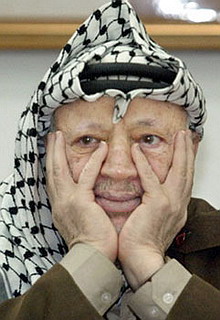Home > A Year Later, Arafat Mourners Are Subdued

By GREG MYRE
RAMALLAH, West Bank, Nov. 11 - One year after Yasir Arafat died and was buried in a tumultuous funeral, the crowd was far smaller and the mood subdued today at a commemoration service next to the former Palestinian leader’s grave.
Mr. Arafat was the dominant Palestinian figure for nearly four decades, and his legacy lives on. His photo still hangs in government offices and shops, and many Palestinians describe him as a father figure.
Yet public tributes and references to Mr. Arafat tend to be relatively infrequent and low-key. When his name is raised, educated Palestinians, in particular, say any assessment of his legacy needs to include both his successes and his shortcomings.
"He did a lot of things for the Palestinians that no one else could have done," said Mamdouh Nofal, a former guerrilla commander who recently wrote a book on Mr. Arafat. "At the same time, I saw him as an obstacle to internal changes and reforms the Palestinians needed to make."
Mr. Nofal was among some 2,000 Palestinians at the afternoon service at the Muqata, the sprawling compound that serves as the Palestinian political headquarters in the West Bank.
Israel confined Mr. Arafat to the compound for most of the last three years of his life, though he was treated at a French military hospital for two weeks before he died on Nov. 11, 2004. He was buried the following day at the Muqata in a chaotic funeral attended by tens of thousands of anguished mourners.
The Palestinian leader Mahmoud Abbas said he remained committed to Mr. Arafat’s goal of a Palestinian state with a capital in East Jerusalem.
"I renew the pledge to continue on the path that he started and exert whatever efforts are needed to raise the flag of Palestine on the walls, the minarets and the churches of Jerusalem," said Mr. Abbas, who wore a black-and-white keffiyeh as a scarf, in tribute to Mr. Arafat.
Mr. Abbas laid the cornerstone for a memorial to be built around Mr. Arafat’s tomb. The tomb is currently enclosed by glass and was surrounded by floral wreaths today. Yet Mr. Abbas said Mr. Arafat had not sought an elaborate shrine.
"He did not dream of having a palace in Palestine. He dreamed of having a grave in Jerusalem," Mr. Abbas said. "God willing, he will be buried in Jerusalem."
Israel, which claims all of Jerusalem as its capital, opposed Mr. Arafat’s burial in the city, just south of Ramallah.
Under Prime Minister Ariel Sharon, Israel refused to deal with Mr. Arafat during his final years. Israel said he encouraged violence and was ultimately responsible for terror attacks carried out by various Palestinian factions, including groups linked to Mr. Arafat’s Fatah movement.
Mr. Abbas has called such Palestinian attacks counterproductive, and in February he and Mr. Sharon announced a truce that has reduced, though not halted, violence.
While Mr. Arafat was elected once as leader of the Palestinian Authority, in 1996, he postponed subsequent polls, citing the fighting with Israel.
Ever since his death, the Palestinians have been making up for missed elections. Mr. Abbas won the January election to succeed Mr. Arafat, municipal ballots have been held in several stages throughout the West Bank and the Gaza Strip, and parliamentary polls are planned for this coming January.
Mr. Abbas lacks the charisma of his predecessor, and his speech today was dry and sober, receiving only brief, polite applause. Palestinians complain that he rarely has contact with ordinary people, while Mr. Arafat thrived on such encounters.
"Yasir Arafat must have had his picture taken with every Palestinian. And he kissed everyone, from the old women to the young children," said Ziad Abu Ein, an official in the Fatah movement. "We don’t see this now."
But Jibril Rajoub, a top security commander under Mr. Arafat, and a security adviser to Mr. Abbas, said, "It’s unfair to compare any other Palestinian to Yasir Arafat."
Mohammed Muqbel, 60, told a personal story that seemed to capture the mixed feelings many Palestinians had toward Mr. Arafat.
A bureaucrat who knew Mr. Arafat well, Mr. Muqbel also had a habit of leading crowds in anti-Arafat chants.
Mr. Arafat had him detained five times, most recently two years ago, when Mr. Muqbel said he was held for three weeks before being released. Yet he was at the grave today, offering a few words of praise - and a bit of criticism.
"Despite all his mistakes and negative qualities, he was our symbol," said Mr. Muqbel. "His door was always open to the Palestinian people. He would meet poor people and give them money - and then he would turn around and give money to people who were thieves."




